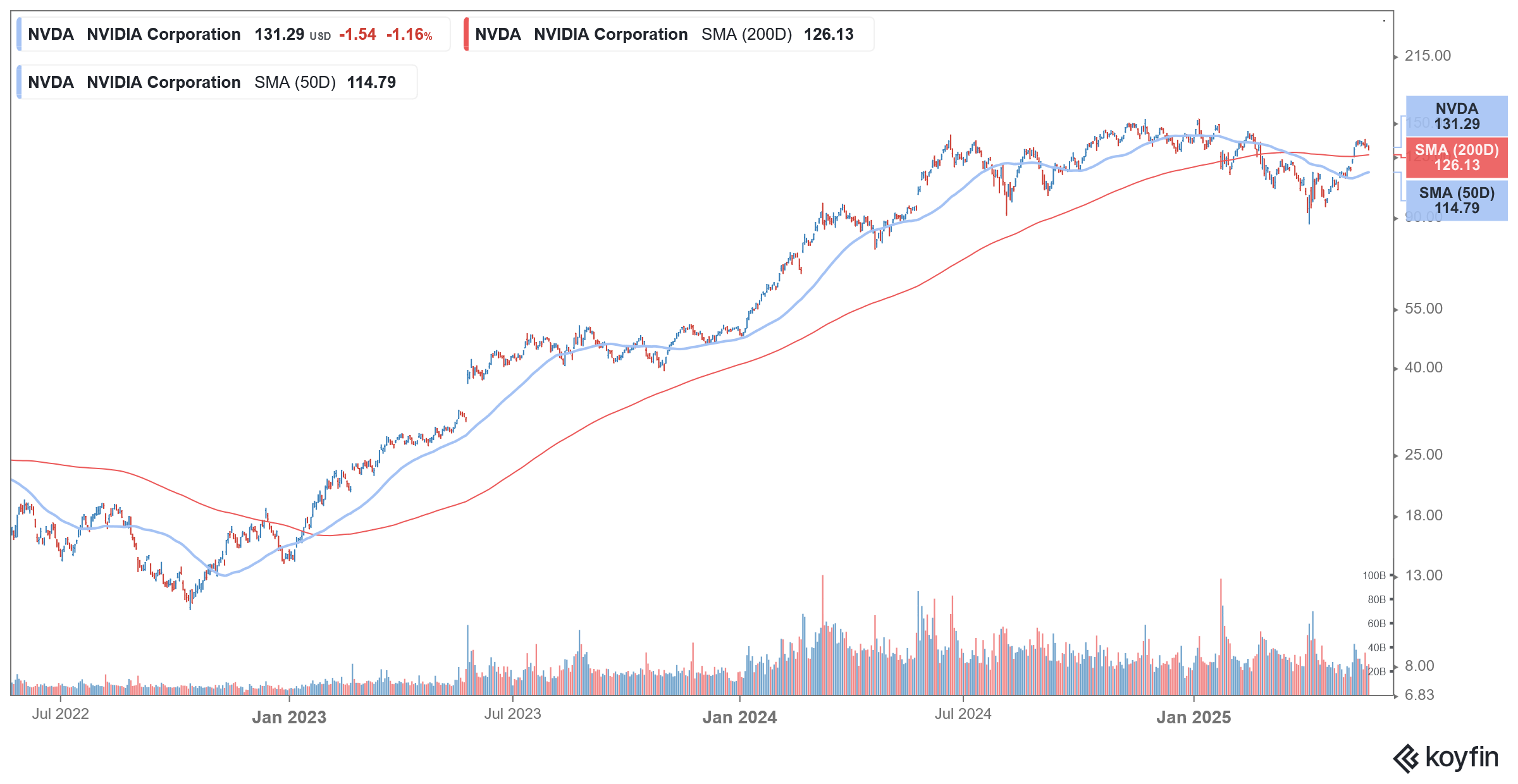Nvidia Is Reportedly Considering a New AI Chip for China After Export Control Restrictions
Please note that we are not authorised to provide any investment advice. The content on this page is for information purposes only.
Nvidia (NYSE: NVDA) is reportedly considering a cheaper artificial intelligence (AI) chip for China. The move comes after the US imposed restrictions on exports of its H20 chips to China.
According to the Reuters report, the graphics processing unit will be based on Nvidia’s latest Blackwell-architecture AI processors. These are expected to be priced between $6,500 and $8,000, significantly below the $10,000-$12,000 Nvidia was charging for the H20 chips.
An Nvidia spokesperson told Reuters, “Until we settle on a new product design and receive approval from the U.S. government, we are effectively foreclosed from China’s $50 billion data center market.”
Table of Contents
The US Imposed New Export Control Restrictions on China
Earlier this month, the Trump administration announced export controls on Nvidia’s H20 chips. Nvidia had designed these chips for China after the Biden administration had barred the company from exporting its top-of-the-line chips to the Communist country. After the Trump administration’s ban on exports of H20 chips, Nvidia wrote off its inventory by a mammoth $5.5 billion.
There is an apparent AI war between the US and China. While the former blocked companies from exporting top-end AI chips to China, citing possible military use, many, including Nvidia CEO Jensen Huang, believe that the policy hasn’t succeeded.
Chinese Companies Have Launched Low-Cost AI Models
Speaking at the annual Computex event in Taipei, Huang said, “All in all, the export control was a failure”. Notably, despite the US ban, several Chinese companies came up with AI models which, while being comparable to those from Western rivals, were developed at a fraction of the cost. For instance, Chinese AI startup DeepSeek claimed to have developed its model at only $6 million, while US tech companies are spending a lot more on similar models.
Alibaba has also been launching new models, and in April it launched its Qwen3 series, hybrid reasoning models which it says gels “the capabilities of fast, simple responses and deeper chain-of-thought reasoning into a single model.”
During the fiscal Q4 earnings call earlier this month, Alibaba pointed to the strong growth in its AI business. Alibaba’s cloud business reported an 18% YoY rise in Q4 revenues, which the company said was “primarily driven by an even faster public cloud revenue growth, including the increasing adoption of AI-related products.”
Previously, Alibaba has vowed to invest $52 billion towards AI and cloud computing over the next three years, which happens to be the single largest investment in this field from a Chinese private company.
Nvidia Is Losing Market Share in China
Nvidia has been losing its market share, and the company has warned that it is losing its competitive edge in the country where it once had a dominant market share. In its fiscal Q4 2024 earnings call, Nvidia said, “as a percentage of total Data Center revenue, data center sales in China remained well below levels seen on the onset of export controls.”
While Nvidia had a nearly 95% share in China’s AI chip market, it has reportedly fallen to just about 50%. Domestic Chinese companies, especially Huawei, have raised their game in AI chips and are gaining market share at Nvidia’s cost.
Huawei is reportedly testing its Ascend 910D chips, which are said to be more powerful than Nvidia’s H100 AI chips. The 910D chips are successors to Huawei’s 910B and 910C chips, and reports suggest that their mass shipments could begin soon.
Despite US export restrictions, Chinese tech companies are progressing in AI. According to Huang, China is not much behind the US in the AI race.
Ray Wang, an independent tech and chip analyst with a focus on U.S.-China competition also echoes similar views and said, “That’s partly why we are seeing a closing of the gap between Chinese and U.S. AI capabilities,” added Wang.
Are US Export Control Measures Counterproductive?
Some others believe that the US export control rules are counterproductive and have only hastened China’s progress in AI.
“The effects of the controls are twofold. They have the impact of reducing the ability of U.S. companies to access the China market and, in turn, have accelerated the efforts of the domestic industry to pursue greater innovation,” said Paul Triolo, Partner and Senior VP for China at DGA Group.
He added, “The bottom line is, the controls have incentivized China to become self-sufficient across these supply chains in a way they never would have contemplated before.”
Triolo said that the export controls have only created new competitors for US companies.“You create competitors to your leading companies at the same time you’re cutting them off from a massive market in China,” said Triolo.
Nvidia To Release its Q1 Earnings
Nvidia will release its fiscal Q1 2026 earnings on May 28, where the company might talk more about its plans to design new chips for China. Analysts expect the company to report revenue of $43.2 billion, marking a 66% year-over-year increase. The company has beaten estimates in every quarter, barring one, over the last five years. However, the margin of its beat was quite narrow in the previous quarter, which raised concerns over the growth trajectory.
As Nvidia gears up to release its quarterly earnings, markets will watch out for several metrics, especially the guidance for the current quarter, which would help gauge the sales outlook for its AI chips.






